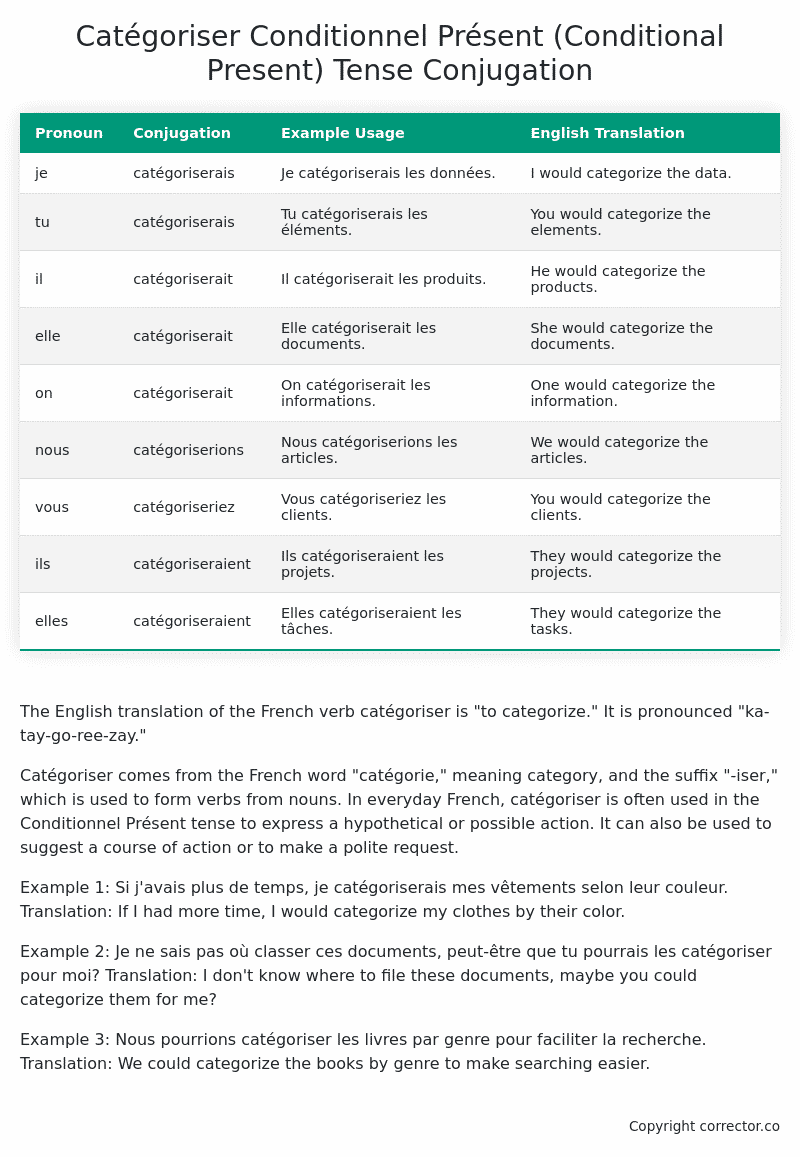Conditionnel Présent (Conditional Present) Tense Conjugation of the French Verb catégoriser
Introduction to the verb catégoriser
The English translation of the French verb catégoriser is “to categorize.” It is pronounced “ka-tay-go-ree-zay.”
Catégoriser comes from the French word “catégorie,” meaning category, and the suffix “-iser,” which is used to form verbs from nouns. In everyday French, catégoriser is often used in the Conditionnel Présent tense to express a hypothetical or possible action. It can also be used to suggest a course of action or to make a polite request.
Example 1: Si j’avais plus de temps, je catégoriserais mes vêtements selon leur couleur.
Translation: If I had more time, I would categorize my clothes by their color.
Example 2: Je ne sais pas où classer ces documents, peut-être que tu pourrais les catégoriser pour moi?
Translation: I don’t know where to file these documents, maybe you could categorize them for me?
Example 3: Nous pourrions catégoriser les livres par genre pour faciliter la recherche.
Translation: We could categorize the books by genre to make searching easier.
Table of the Conditionnel Présent (Conditional Present) Tense Conjugation of catégoriser
| Pronoun | Conjugation | Example Usage | English Translation |
|---|---|---|---|
| je | catégoriserais | Je catégoriserais les données. | I would categorize the data. |
| tu | catégoriserais | Tu catégoriserais les éléments. | You would categorize the elements. |
| il | catégoriserait | Il catégoriserait les produits. | He would categorize the products. |
| elle | catégoriserait | Elle catégoriserait les documents. | She would categorize the documents. |
| on | catégoriserait | On catégoriserait les informations. | One would categorize the information. |
| nous | catégoriserions | Nous catégoriserions les articles. | We would categorize the articles. |
| vous | catégoriseriez | Vous catégoriseriez les clients. | You would categorize the clients. |
| ils | catégoriseraient | Ils catégoriseraient les projets. | They would categorize the projects. |
| elles | catégoriseraient | Elles catégoriseraient les tâches. | They would categorize the tasks. |
Other Conjugations for Catégoriser.
Le Present (Present Tense) Conjugation of the French Verb catégoriser
Imparfait (Imperfect) Tense Conjugation of the French Verb catégoriser
Passé Simple (Simple Past) Tense Conjugation of the French Verb catégoriser
Passé Composé (Present Perfect) Tense Conjugation of the French Verb catégoriser
Futur Simple (Simple Future) Tense Conjugation of the French Verb catégoriser
Futur Proche (Near Future) Tense Conjugation of the French Verb catégoriser
Plus-que-parfait (Pluperfect) Tense Conjugation of the French Verb catégoriser
Passé Antérieur (Past Anterior) Tense Conjugation of the French Verb catégoriser
Futur Antérieur (Future Anterior) Tense Conjugation of the French Verb catégoriser
Subjonctif Présent (Subjunctive Present) Tense Conjugation of the French Verb catégoriser
Subjonctif Passé (Subjunctive Past) Tense Conjugation of the French Verb catégoriser
Subjonctif Imparfait (Subjunctive Imperfect) Tense Conjugation of the French Verb catégoriser
Conditionnel Présent (Conditional Present) Tense Conjugation of the French Verb catégoriser (this article)
Conditionnel Passé (Conditional Past) Tense Conjugation of the French Verb catégoriser
L’impératif Présent (Imperative Present) Tense Conjugation of the French Verb catégoriser
L’infinitif Présent (Infinitive Present) Tense Conjugation of the French Verb catégoriser
Struggling with French verbs or the language in general? Why not use our free French Grammar Checker – no registration required!
Get a FREE Download Study Sheet of this Conjugation 🔥
Simply right click the image below, click “save image” and get your free reference for the catégoriser Conditionnel Présent tense conjugation!

Catégoriser – About the French Conditionnel Présent (Conditional Present) Tense
Formation
Common Everyday Usage Patterns
Expressing Polite Requests
Expressing Hypothetical Situations
Expressing Doubt or Uncertainty
Interactions with Other Tenses
Present Tense
Past Tense
Future Tense
Conditional Perfect
Summary
Want More?
I hope you enjoyed this article on the verb catégoriser. Still in a learning mood? Check out another TOTALLY random French verb conjugation!


